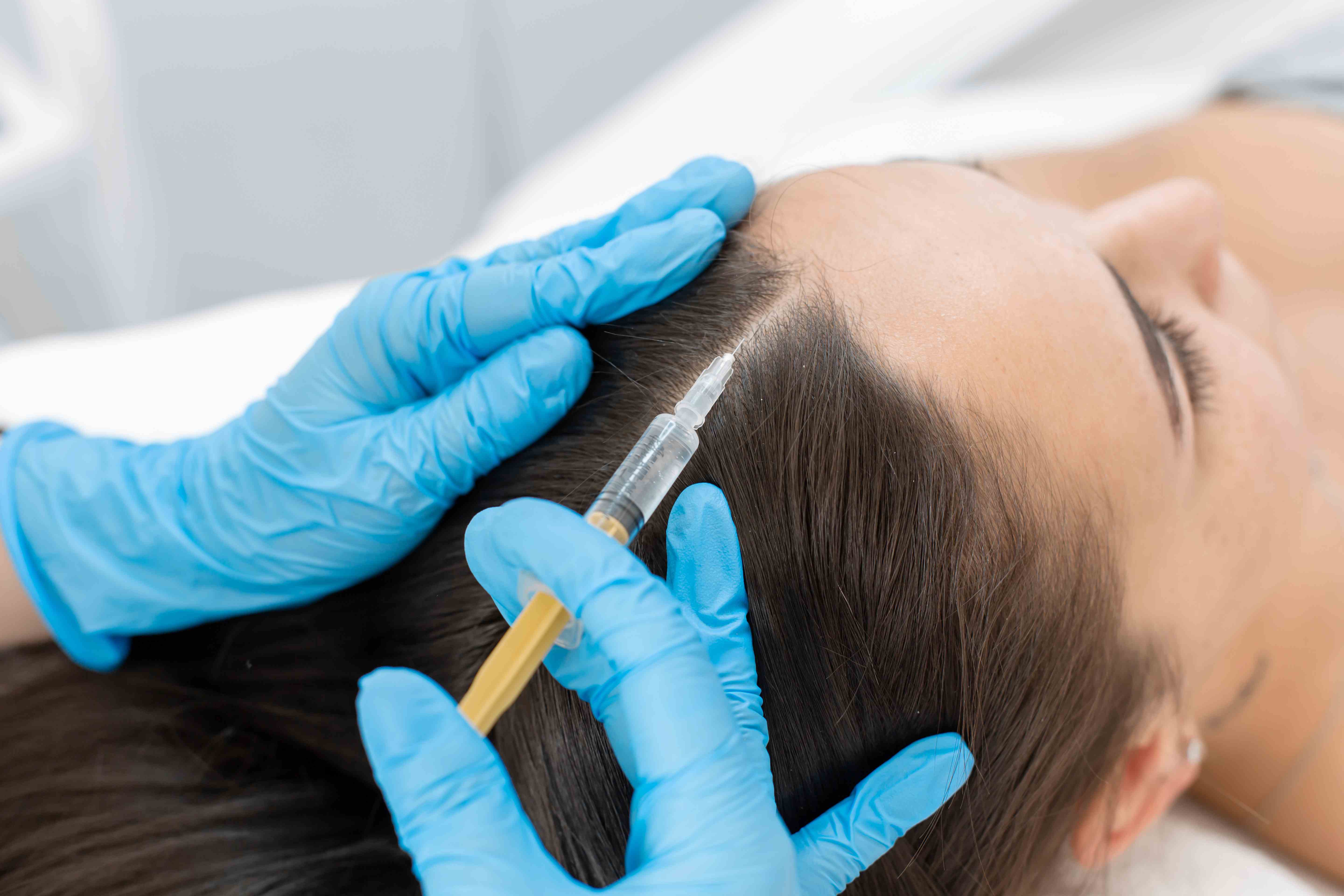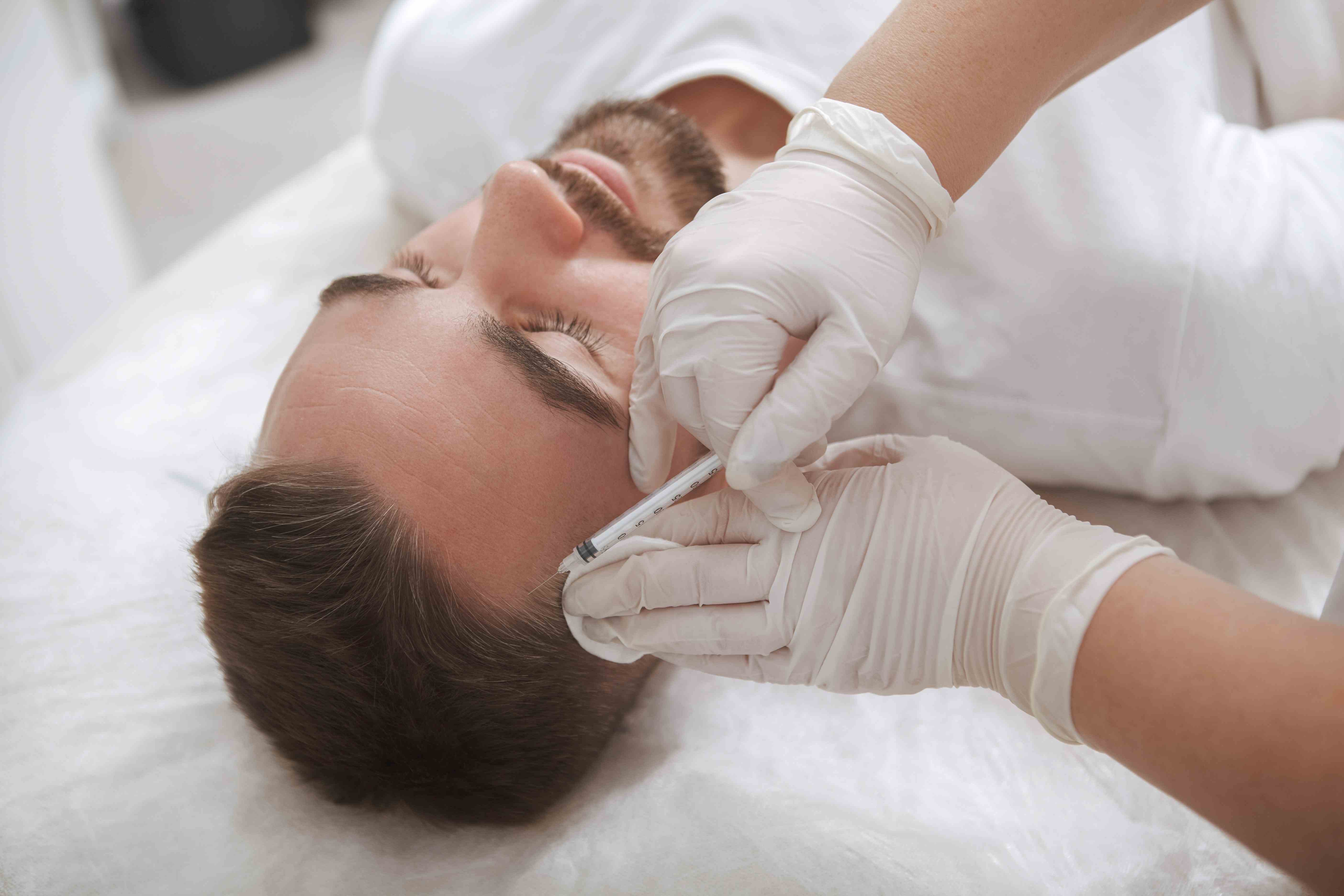
-
Doctor:
Dr. Lukesh Patil
-
Service
Hair Fall and Loss Treatment
-
Tag:
Hair Fall and Loss Treatment in Navi Mumbai
Say Goodbye to Hair Fall and Loss, and Hello to Healthier Hair!
Noticing more hair than usual on your pillow or in the shower drain? You’re not alone! Hair fall can be frustrating, but the great news is, it’s treatable! At Seraphic Aesthetics, we offer PRP (Platelet-Rich Plasma) and Growth Factor Concentrate (GFC) therapy, two of the most advanced and effective treatments for reducing hair fall and promoting new hair growth.
Led by Dr. Lukesh Patil, a board-certified plastic surgeon, our expert team is dedicated to providing exceptional hair fall and loss treatment in Navi Mumbai.
Ready to put an end to the shedding and rejuvenate your hair? Book your consultation today!
How Can PRP Therapy Help You Fight Hair Fall?
PRP therapy is a minimally invasive, non-surgical treatment that uses your own blood to encourage hair growth. Here's the simple process:

Blood Draw: We take a small sample of your blood.
PRP Extraction: Using a centrifuge, we separate the platelet-rich plasma (PRP), which is packed with growth factors.
Injection: The PRP is then carefully injected into your scalp, targeting areas where your hair is thinning or falling out.
This stimulates dormant follicles, boosts circulation, and helps your hair grow back stronger. Dr. Lukesh Patil makes sure you get the best care for amazing results.
GFC Therapy: Taking Hair Restoration to the Next Level
GFC therapy takes things a step further by delivering an even higher concentration of growth factors. Here's how it works:
Blood Draw: A small blood sample is taken.
GFC Extraction: The blood is processed to extract highly concentrated growth factors.
Injection: These growth factors are injected directly into your scalp to revive your hair follicles.
With Dr. Lukesh Patil overseeing every step, GFC therapy offers superior results, tailored to your hair’s unique needs
Ideal Candidates for PRP and GFC Treatments
Both PRP and GFC treatments work best during the early to moderate stages of hair loss. Here’s who would benefit most:
You’re experiencing early hair thinning and want to stop the fall and encourage regrowth.
You have small patches of hair loss and want to revive the follicles.
Your hair is thinning overall, but you still have some active follicles.
You’re in good health and not on blood-thinning medications.
Note: These treatments are most effective when hair follicles are still active. They may not be effective for complete baldness or scarring alopecia.
Benefits of PRP and GFC for Hair Fall
Here’s what you can expect from these treatments:
Natural Growth: Your own growth factors are used to promote healthier, fuller hair.
Non-Surgical: Safe, minimally invasive procedures with no cuts or stitches.
Stronger Results with GFC: Higher concentration of growth factors for more potent hair restoration.
Stimulates Growth: Activates dormant follicles for thicker, healthier hair.
Minimal Downtime: Quick recovery, allowing you to return to normal activities fast.
Aftercare Tips for PRP & GFC
Rest: Take it easy for 24-48 hours to let your scalp recover.
Wash Gently: Wait 1-2 days before washing your hair with a gentle, sulfate-free shampoo.
Avoid Heat: Skip hot showers, saunas, and heat treatments for a few days.
Hydrate: Drink plenty of water to nourish your body and enhance results.
Be Gentle: Avoid touching or massaging your scalp too roughly after treatment.
Cost of Hair Loss and Fall Treatment in Navi Mumbai
The cost of hair loss and fall treatment varies depending on the type of treatment (PRP or GFC), the number of sessions you need, and the severity of your hair loss. At Seraphic Aesthetics, we tailor a personalized treatment plan to meet your specific needs and goals. During your consultation with Dr. Lukesh Patil, we’ll explain the treatment plan, provide a transparent cost breakdown, and ensure you feel confident and comfortable with the entire process. No hidden costs, just real results!
Why Choose Us?
Here’s why we’re the top choice for hair fall and loss treatment in Navi Mumbai:
Expert care from Dr. Lukesh Patil, a board-certified plastic surgeon, and our skilled team.
Advanced treatments like PRP and GFC for highly effective hair restoration.
Customised solutions designed to meet your unique hair restoration needs.
Non-surgical, minimally invasive options for a safe, convenient experience.
Proven results with natural, long-lasting hair regrowth.
Transparent pricing with no hidden fees. Just clear, upfront costs.
Book Your Consultation Today!
Say goodbye to hair fall with our advanced PRP and GFC treatments! Book your consultation with Dr. Lukesh Patil at Seraphic Aesthetics for personalised hair restoration.
FAQs
1. I’m 18, have thin hair, and am experiencing hair fall. Can I go for PRP treatment?
Hair thinning and hair fall can be caused by several factors, including diet and lifestyle. It’s best to schedule a consultation with Dr. Lukesh Patil, who will assess your hair’s condition and recommend the most suitable treatment.
2. How soon can I see results after PRP for hair loss?
PRP sessions are typically spaced about a month apart. You’ll begin to notice visible results as you progress with each session.
3. Is GFC treatment for hair fall better than PRP?
GFC offers a higher concentration of growth factors compared to PRP, making it a more potent treatment for hair restoration. Both treatments are effective, and Dr. Lukesh will help you choose the option that best suits your needs.
4. What is the cost of hair fall and loss treatment in Navi Mumbai?
The cost varies depending on factors like the extent of hair loss and the number of sessions. During your consultation, Dr. Lukesh Patil will provide a clear cost breakdown tailored to your needs. Contact us for more details!

